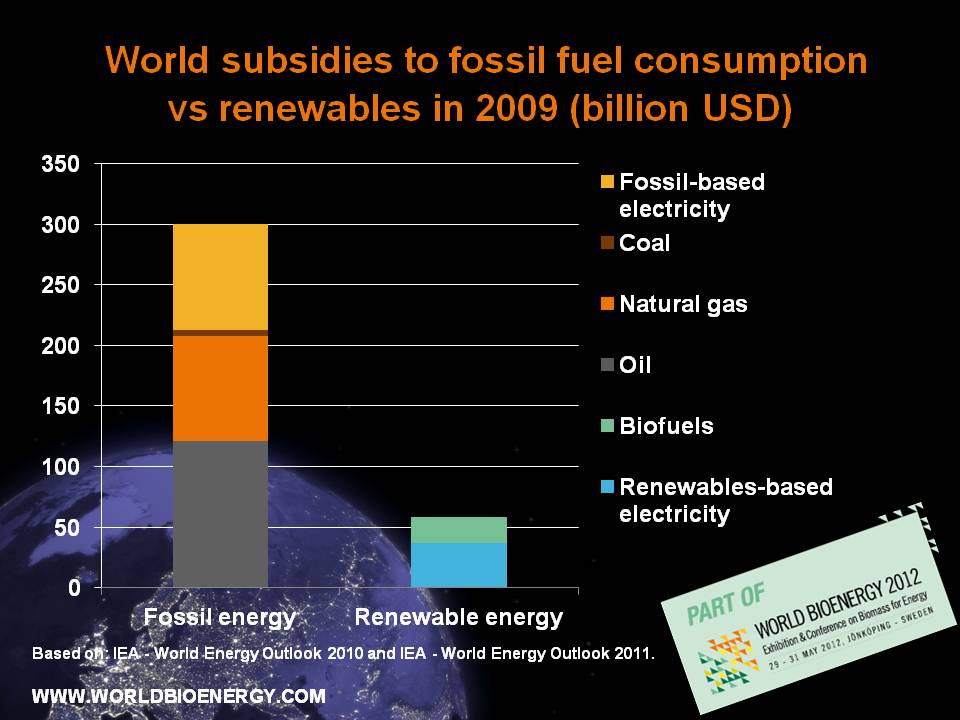World subsidies for fossil fuels 5x larger than for renewables
Something is wrong in the world of energy subsidies. According to statistics gathered by the International Energy Agency (IEA) the worldwide subsidies to fossil fuel consumption in 2009 amounted to no less than 300 billion USD, while at the same time the global support for renewables was almost 60 billion USD. This means that global government spending on promoting fossil fuels was five times higher than on promoting carbon dioxide neutral renewable energy sources.
The reasons for promoting the use of renewables are easily understood. Renewable energy sources (bioenergy, hydropower, windpower, solar and geothermal energy) are not only beneficial in a carbon dioxide emissions perspective. They are usually locally produced and harvested, generating jobs and income in rural areas. Arguments as decentralized energy production, security of supply, less dependency on imported energy and long term readiness for shortages in the supply of fossil energy are all good.
Diagram: World subsidies to fossil energy vs renewable energy in 2009 (billion USD)
Based on: IEA - World Energy Outlook 2010 and IEA - World Energy Outlook 2011.
The intentions for fossil fuel subsidies may also be good in the first place. The typical rationale is to alleviate poverty and promote economic development by providing cheaper energy in the form of fossil fuels. However, not only do fossil fuel subsidies increase CO2 emissions. They often also fail to meet their intended objectives while instead encouraging wasteful consumption, hasten the decline of exports, threaten energy security by increasing imports, distort markets and create barriers to clean energy investments. (World Energy Outlook 2011, IEA)
The global fossil fuel consumption subsidies were driven even higher in 2010 by the rebound in international energy prices. From 300 to 409 billion USD, and these subsidies are set to reach 660 billion USD in 2020 or 0.7% of global GDP, without further reforms.
But the future is not all dark. Phasing out fossil fuel consumption subsidies by 2020 would slash the growth in global energy demand by 4,1% and reduce the growth in oil demand by 3.7 million barrels per day, leading to 1.7 billion tonnes less CO2 emissions. Many countries have now started or planned reforms of their fossil fuel subsidy systems.
Contact
Jakob Hirsmark, exhibition manager, Elmia AB, 46 36 15 22 14, jakob.hirsmark@elmia.se
Kjell Andersson, communications, Svebio, 46 8 441 70 80, worldbioenergy@svebio.se
World Bioenergy 29-31 May 2012
Organised every second year this major global bioenergy get-together is based on the unique “Taking you from Know-How to Show-How” concept, combining tradeshow, conference sessions, field excursions and matchmaking into one comprehensive event. Welcome to our web site to see conference topics and read more about the different parts of the event. Organisers: Elmia AB and the Swedish Bioenergy Association, Svebio. Venue: Elmia, Jönköping, Sweden. www.worldbioenergy.com
Tags:




